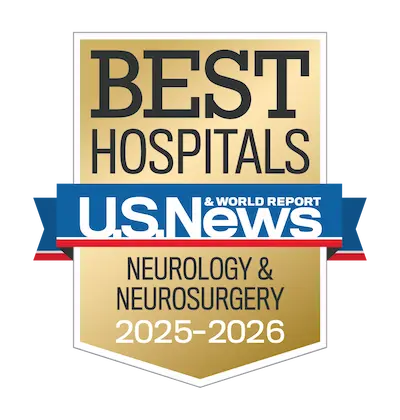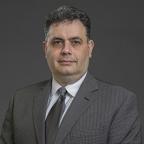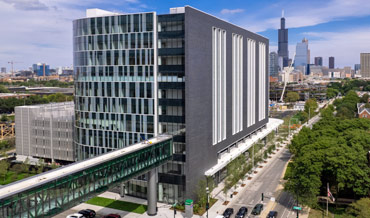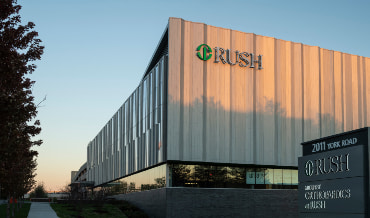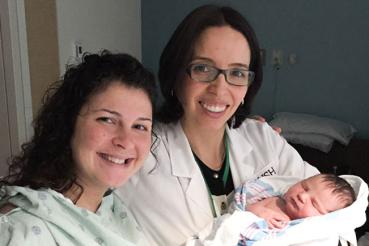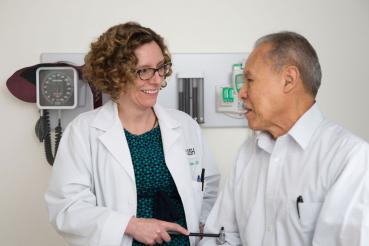Epilepsy is a brain disorder where clusters of nerve cells sometimes send abnormal signals, often causing seizures.
Having one seizure doesn't mean you have epilepsy. But it does mean you should speak to a doctor to find the cause.
Epilepsy can develop because of damage to the brain from a head injury or from disorders that affect the brain, such as a brain tumor or stroke. But it often develops without a specific known cause.
Physicians will describe and classify your seizures by the following:
- Generalized or focal, depending on whether the seizures affects both sides of your brain or start on only one side of your brain
- Aware or impaired based on how aware you are during the seizure
- Motor or nonmotor whether movement occurs during the seizure
- If the seizure is motor, they’ll further describe the type of movement as myoclonus if muscles are twitching, atonic if muscles go limp, clonic if the muscles jerk, or tonic if the muscles go rigid
The Rush Approach to Epilepsy Care
At Rush, we provide a full evaluation of your seizures and overall situation. We want to understand the effect your seizures have on you and your family.
Then our specialists from many fields work as a team to offer solutions that best fit your lifestyle and needs, whether that’s medication or surgery. Our team includes epileptologists, neurosurgeons, neurophysiologists, neuropsychologists, neuroradiologists and social workers, all with epilepsy expertise.
Rush University Medical Center is a level 4 epilepsy center, according to the National Association of Epilepsy Centers. That means it meets the highest standards for seizure diagnosis and care.
We specialize in treating seizures that don’t respond to medication, also called intractable epilepsy. For instance, our state-of-the-art electroencephalogram (EEG) laboratory and high-definition MRI lets us both find the source of seizures and perform epilepsy surgery more precisely — so you get better results.
While our level 4 center is in Chicago, we work across Rush locations to meet patients where they are. Through telemedicine visits and locations in the western suburbs, our goal is to help you find relief from seizures as quickly — and as conveniently — as possible.
Epilepsy Diagnosis at Rush
If you’ve had a seizure, your primary care provider may refer you for specialized testing.
Epilepsy testing often includes an EEG to measure electrical activity in your brain and try to locate the source of seizures. This is called "seizure localization" or finding the seizure's "focus."
EEGs performed at Rush are read by our epilepsy specialists. We use many types of EEGs and other seizure imaging. Some of these tests may include the following:
- Routine EEG: This records electrical activity in your brain for a short period of time, typically 30 minutes.
- Continuous video EEG (VEEG): Scalp electrodes record video and audio of your seizure. It’s used for longer-term monitoring to capture seizures, part of diagnostics and/or to evaluate you for epilepsy surgery.
- High density EEG (HEEG): Similar to a scalp EEG, an HEEG uses more electrodes combined with high-quality imaging. This gives doctors a better sense of where the seizures come from and can be used to plan epilepsy surgery. If we also need to do an intracranial EEG, an HEEG gives us more targeted planning and guidance.
- SISCOM: Epileptologists use this brain mapping tool to visualize activity in your brain during a seizure. It is not invasive and can be used to plan surgery.
- Intracranial EEG monitoring: This test uses electrodes implanted in your brain by a neurosurgeon to record brain waves. It helps more precisely identify where your seizures come from than an MRI, scalp EEG or other imaging.
- Stereotactic EEG (SEEG): Similar to an intracranial EEG, this uses electrodes implanted in your brain, but it is less invasive. With SEEG, neurosurgeons use stereotactic guidance. This means they combine at least two forms of imaging to provide a more three-dimensional map of your brain.
Types of Treatment at Rush: What to Expect
Rush general neurologists work together with epileptologists — epilepsy experts who can give specialized care. If your seizures are difficult to control, your neurologist may recommend you see an epileptologist directly.
Depending on the type of epilepsy you have and the goals of your care, they will provide you with different treatment options that may include the following:
- Controlling seizures with antiseizure medications: Between 60% and 70% of patients with epilepsy gain full seizure control through antiseizure medication.
Epilepsy specialists focus on selecting the best regimen of medications for each patient. Our goal is to stop your seizures completely while avoiding drug side effects whenever possible. - Intractable epilepsy care: If you have seizures that haven't been controlled by two or more medications, you may have intractable epilepsy. This is also known as "refractory epilepsy" or "drug-resistant epilepsy."
Some people with intractable epilepsy may have the wrong initial diagnosis or be on the wrong medication.
Rush epileptologists may recommend a medication that is more effective for you, advanced EEG monitoring for more precise seizure localization, and surgical and brain modulation options to stop seizures. - Nonepileptic seizure care: One-third of all patients admitted to an epilepsy monitoring unit for intractable seizures are found to actually have functional seizures, also known as psychogenic nonepileptic seizures, or PNES.
Though they resemble epileptic seizures — either generalized seizures (falling and shaking) or focal seizures (staring spells, or other changes in perception or behavior) — functional seizures are not caused by abnormal electrical activity in the brain.
They may be associated with past traumatic experiences or other psychiatric or psychological factors. But sometimes none of these factors are identified by the patients at the time they come to the clinic.
Because functional seizures do not respond to typical antiseizure mediations and are not under the person's voluntary control, they can profoundly affect quality of life. In fact, people with functional seizures often need many trips to the ER or hospitalizations before being properly diagnosed. - Antiseizure dietary approaches: Dietitians and epileptologists at Rush counsel patients on use of the modified ketogenic (keto) diet and low glycemic diet to control epilepsy.
The modified keto diet is a special high-fat, low-carbohydrate diet that your doctor may recommend for your epilepsy.
A low glycemic index diet also monitors your total carbohydrates but instead focuses on carbohydrates that have a low glycemic index. Glycemic index refers to the amount the food raises your blood glucose after eating. - Specialized care for women with epilepsy: Epilepsy specialists at Rush are committed to addressing the unique concerns of girls and women with epilepsy — from increased seizure activity during your menstrual cycle, or catamenial epilepsy, to the effect certain antiseizure drugs and oral contraceptives can have on each other.
If you are ready to start a family, we're here to help keep you and your baby safe. Through a partnership with your OB/GYN, we strive to minimize seizures as much as possible during your pregnancy and delivery.
If you're having difficulty conceiving, which can happen because some anti-seizure drugs can affect reproductive hormones, we'll work closely with your reproductive endocrinologist to regulate your medications so they won't interfere with fertility treatments but will still help manage seizures. - Epilepsy surgery and nonsurgical procedures: Rush neurosurgeons perform the following surgeries and minimally invasive procedures:
- Removal of seizure focus
- Focal resection: Neurosurgeons remove the part of the brain causing seizures, called the "focus." One of the most common focal resections performed is temporal lobectomy. In temporal lobectomy, neurosurgeons remove parts of the temporal lobe to treat epilepsy.
- Neuromodulation
- Vagus nerve stimulation: Neurosurgeons implant a device that prevents seizures by sending mild pulses of electrical energy to the brain through the vagus nerve. It can be used for children and adults.
- Deep brain stimulation (DBS): Rush neurosurgeons in downtown Chicago offer deep brain stimulation for epilepsy. DBS is performed while the patient is under general anesthesia, not awake. It may benefit people with uncontrolled, or intractable, seizures.
- Responsive neurostimulation (RNS): Neurosurgeons implant a neurostimulator device, also known as NeuroPace, that monitors brain electrical activity. They use an electrode-mapping system to determine where to implant the device for better seizure control. The device detects abnormal brain wave activity. The neurostimulator then delivers small pulses to stop the seizure from happening.
- Laser Interstitial Thermal Therapy (LITT): Neurosurgeons heat the tip of a laser catheter to burn the lesion area causing seizures. LITT can significantly improve seizures using only a small hole in your scalp that is easily stitched.
People with mesial temporal sclerosis are often ideal candidates for LITT.
Radiofrequency ablation (RFA): Neurosurgeons use a special device to create a radiofrequency lesion in the brain at the seizure focus guided by already implanted stereotactic EEG (SEEG) electrodes. - Corpus callosotomy: Neurosurgeons cut the corpus callosum, which connects the left and right sides of the brain. This stops seizures from spreading from one side of the brain to the other.
It is most often used for people with intractable drop seizures. Although not a cure, it can reduce how often you have seizures.
- Removal of seizure focus
- Telemedicine options: If you are unable to travel to downtown Chicago for specialized epilepsy care, we offer telemedicine visits. With telemedicine, we talk with you through a virtual visit, or online video call, about your potential options.
- Epilepsy team support: Our epilepsy team includes nurses, nurse practitioners and social workers. They provide you with ongoing epilepsy education and support.
We also offer specialized psychiatry to work with epilepsy patients and their families to address depression, anxiety and other mental health concerns that are often associated with epilepsy.
The epilepsy team's goal is to make sure you don't have to live with seizures that are not controlled. If you live in an area without access to specialized care, the team can help find you the resources, such as transportation or telemedicine, that you need to get a new perspective on your seizure control.
We also work with your current provider to arrange for follow-up care in your area after an epilepsy procedure in Chicago. - Epilepsy clinical trials: Our clinicians actively seek new treatment options for epilepsy. Your epilepsy team may talk with you about a clinical trial for a potential new treatment.
Second Opinions on Epilepsy at Rush
If you’ve been diagnosed with epilepsy or prescribed a treatment plan, getting a second opinion can help you explore your options and feel confident in making decisions about your care.
Our specialists are skilled in diagnosing and treating all types of epilepsy. They work together to approach your case from many perspectives. This may offer you alternatives for care and help you find experts who can guide you through a treatment plan that works for you.
To get a second opinion on an epilepsy diagnosis or treatment, call (888) 352-RUSH (7874). A care coordinator will help connect you with the services you need. You can also learn more on our Getting a Second Opinion page.
Choosing Rush for Epilepsy Treatment
- Experience with lifelong care: Our team sees several thousand patients a year, including adults and children. We have epileptologists who specialize in treating only adult epilepsy, those who treat only pediatric epilepsy and some who treat both. Our downtown Chicago location also has the first clinic in the Midwest for older adults with epilepsy. This high volume of all-ages care means we can draw lessons from literally thousands of patients living with seizures to find a solution that works for you.
- Nationally ranked excellence: Rush University Medical Center neurology and neurosurgery programs are ranked among the best in the nation by U.S. News & World Report. And our center in downtown Chicago is a level 4 NAEC-accredited center. That means it meets the highest standards for seizure diagnosis and care. Rush epileptologists and neurosurgeons work closely with neurologists to provide you with complete seizure treatment, whether you’re in Chicago or the surrounding suburbs.
- Convenient medication through our specialty pharmacy: Finding the right medication for epilepsy takes expertise. When we recommend a medication, we look at your lifestyle, medical history and overall health. That's because antiseizure drugs can affect other health issues, such as migraines, weight loss or weight gain, birth control effectiveness and more. Our downtown Chicago location has a specialty pharmacy that processes all patients' antiseizure medications. The medications are mailed directly to your home. The pharmacy also sends reminders when your medication is about to run out, so you don’t miss any doses.
- Dietary therapy for seizures: Dietary approaches have been shown to make seizures less severe and less frequent and improve quality of life in many people with epilepsy. Our registered dietitian works with an epileptologist to cover what you need to know about following the modified keto diet or low glycemic index diet. They tailor your diet plan based on the type of epilepsy and seizures you have, seizure frequency and your medical history, family support and nutritional needs. Rush is one of only a few places in the U.S., and the first in Illinois, to offer ketogenic diet therapies for adults with epilepsy.
- Special care for intractable epilepsy: If you have not responded to at least two antiseizure drugs in the right dose and with the right medication selection, you are less likely to respond to more drugs. Because our team specializes in intractable epilepsy, we can find alternatives when other treatments have not worked.
- Finding seizure focus: Getting relief for intractable epilepsy starts with finding your seizure focus — the place in your brain where your seizures come from. To do this, we have many options offered through our EEG laboratory, the largest and busiest EEG facility in the Chicago area. And EEG monitoring helps our specialists evaluate patients for and plan epilepsy surgery.
- Epilepsy surgery options: Rush neurosurgeons perform epilepsy surgery and procedures that are not widely available, including asleep deep brain stimulation. We also offer laser interstitial thermal therapy, also known as LITT or thermal ablation. And our focal resection surgeries use advanced imaging to better identify seizure focus.
- Care for nonepileptic seizures: Many people with intractable epilepsy are actually experiencing nonepileptic seizures, or NES. That’s why we created a team of psychiatrists, neurologists, seizure specialists, psychologists and clinical social workers who work together to examine and address the disorder and whatever might be contributing to it. We can provide options like cognitive-behavioral therapy (CBT) and mindfulness therapy to manage psychiatric causes. Our goals are to reduce how often and severely you have seizures, improve your mental health and enable you to enjoy life to the fullest.
- Bettering your quality of life: We look beyond seizure control, helping our patients address the psychological and emotional issues — including depression and anxiety — that often come with epilepsy. Our clinic team includes a psychiatrist and social worker who specialize in working with people with epilepsy and their families.
FAQs About Epilepsy Care
There are many surgical and nonsurgical or minimally invasive procedures that neurosurgeons can use to treat certain types of epilepsy.
Some surgical options focus on removing the part of the brain that causes seizures, or the focus. This is called focal resection. For example, neurosurgeons can perform a temporal lobectomy to remove parts of the temporal lobe. An ideal candidate for this procedure might be a patient with temporal lobe epilepsy who hasn’t responded to medication.
Laser Interstitial Thermal Therapy, or LITT, is another procedure neurosurgeons can use. It uses the heated tip of a laser catheter to burn a lesion area of the brain that causes seizures. Patients with mesial temporal sclerosis are often ideal candidates.
Another procedure is a corpus callosotomy, where neurosurgeons sever the corpus callosum that connects the left and right sides of the brain. It doesn’t cure epilepsy, but it can stop seizures from spreading between sides of the brain and reduce how often seizures happen. It can be an option for people with intractable drop seizures.
Other techniques used by neurosurgeons involve neuromodulation, or changing nerve activity. They can do this in a variety of ways. For instance, they can implant devices or electrodes in the brain to send pulses of energy that control seizures. These techniques can be good options for those with intractable focal seizures who are not candidates for surgery.
To find out if you’re a good candidate for neurosurgery to treat epilepsy, you’ll need to consult a specialist. They can help you explore your care options.
Aside from medical or surgical management, our specialists can offer help with lifestyle changes to manage seizures. For example, diet changes have been shown to help reduce the frequency and severity of seizures, and cognitive-behavioral therapy (CBT) and mindfulness therapy can treat the psychiatric causes of nonepileptic seizures. Psychologists and psychiatrists can also provide care for anxiety and depression that often come with epilepsy and seizure disorders.
Common side effects of epilepsy medications include dizziness, drowsiness and fatigue. Some antiseizure medications may have positive effects on mental state, such as mood improvement, while others can cause negative effects, like irritability. Side effects can vary a lot from patient to patient, depending on things like dosage, the number and combination of antiseizure medications, drug interactions and other medical conditions. Our specialists know that managing these side effects is important because they can have a big impact on a person’s quality of life. They work closely with each patient to watch out for side effects and adjust treatment plans as needed.
Yes, our specialists can offer alternatives to help manage seizures and symptoms, including those caused by intractable epilepsy that does not respond to medication. Some of these include dietary, psychiatric and psychological therapy to control symptoms and improve quality of life.
Personalized epilepsy treatment starts with accurate diagnosis. Our specialists use advanced imaging techniques, including several types of EEG, to pinpoint the part of the brain that is causing seizures and find out if patients are good candidates for surgery. They also work to understand each patient’s lifestyle, goals and needs. For instance, they consider any medications patients may be taking to ensure antiseizure medications will not react poorly or interfere with them. Our experts collaborate with specialists across fields to address all aspects of patient health that can be affected by seizures. They work with OB/GYN services for women with epilepsy to make sure their care options work together. They work with psychiatrists, psychologists and social workers to address the emotional and mental health aspects of seizure disorders. And they work with dieticians for patients who can benefit from dietary changes. These are only a few of many ways that each patient gets custom care options to address their seizures at Rush.
Our epilepsy care team includes psychiatrists, psychologists and clinical social workers who work with patients and their families to address the mental and emotional health aspects of epilepsy, including anxiety and depression. Beyond treatment and management of seizures, our goal is to improve quality of life for our patients and their loved ones.
Our neurologists and epileptologists frequently explore new options for care through clinical trials. Qualified patients may participate in these trials. Your specialists will discuss these options if they are right for you. You can see which epilepsy clinical trials Rush is participating in on our Clinical Trials page.
Our specialists adhere to the highest standards of safety for all epilepsy care. For example, we know going off seizure medication for continuous monitoring can be dangerous, so we have highly trained EEG technologists monitoring patients for an extra level of care. We also have inpatient nurses with specific safety training in the epilepsy monitoring unit. As a level 4 NAEC-accredited center, Rush University Medical Center meets the highest standards, including safety standards, for seizure diagnosis and care.
Epilepsy can’t currently be cured, but it can be managed. In many cases, specialists can reduce how severely and how often patients have seizures so much that they don’t have many or any seizures at all. These patients can lead full lives. Even though epilepsy requires lifelong monitoring and care, and patients will need to follow up, they can have a great quality of life.



